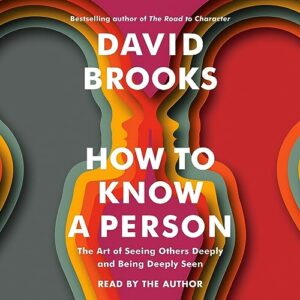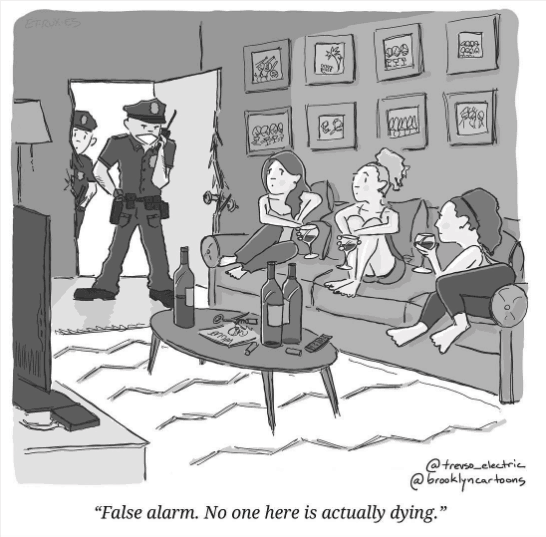Here are some highlights of my life in 2023 A.D. It was a very good year.
 Book – How To Know A Person — the Art of Seeing Others Deeply and Being Deeply Seen by David Brooks. This book is actually my favorite book of the decade. I’ve bought copies for all my direct reports; in 2024 we’ll process the book together one chapter a week.
Book – How To Know A Person — the Art of Seeing Others Deeply and Being Deeply Seen by David Brooks. This book is actually my favorite book of the decade. I’ve bought copies for all my direct reports; in 2024 we’ll process the book together one chapter a week.
Brooks is an American conservative political and cultural commentator who writes for The New York Times. In the preface he writes, “There is one skill that lies at the heart of any healthy person, family, school, community organization, or society: the ability to see someone else deeply and make them feel seen—to accurately know another person, to let them feel valued, heard, and understood.” In his book he teaches us how to do that.
 Travel Moment – On the last day of the Travel with Friends trip to the British Isles, we visited the Beaches of Normandy where the D-Day invasion commenced. It is a quiet, reflective place that includes 9,387 graves where U.S. soldiers are buried. Suddenly, two Mirage fighter jets flew over the cemetery at low altitude and tipped their wings. The sound was deafening; it literally shook the earth. I wept. My son-in-law, who was a flight surgeon on an F-16 squadron, once tried to describe to me the thunderous sound of fighter jets in flight, but I did not understand, until that moment on Omaha Beach.
Travel Moment – On the last day of the Travel with Friends trip to the British Isles, we visited the Beaches of Normandy where the D-Day invasion commenced. It is a quiet, reflective place that includes 9,387 graves where U.S. soldiers are buried. Suddenly, two Mirage fighter jets flew over the cemetery at low altitude and tipped their wings. The sound was deafening; it literally shook the earth. I wept. My son-in-law, who was a flight surgeon on an F-16 squadron, once tried to describe to me the thunderous sound of fighter jets in flight, but I did not understand, until that moment on Omaha Beach.
 Wine – In this annual “best of” list I usually share the name of the best wine I had during the year. But this time I’ll share a good suggestion on how to buy wine.
Wine – In this annual “best of” list I usually share the name of the best wine I had during the year. But this time I’ll share a good suggestion on how to buy wine.
First, take a year or two to decide on your personal “house wines” (moderately good and moderately priced wines that you’re pleased to drink on a regular basis and that are consistently available). For instance, the McMinn’s house-red is Alamos—a Cabernet Sauvignon from Argentina; our house-sparkling is Lamarca—a Prosecco from Spain; and our house-white is Rue de Perle—a Vouvray from France.
About four times a year Kroger’s grocery store has 25% off all wines. That’s when I stock up on house wines. I can buy Alamos for $6.75 per bottle. What a deal.
Group of friends – I am blessed that every week I visit with some of the best  friends I have on earth – members of the Stonebriar Community Church music ministry. I love the staff and each musician who serves. Here’s a picture of our 2023 Christmas concert.
friends I have on earth – members of the Stonebriar Community Church music ministry. I love the staff and each musician who serves. Here’s a picture of our 2023 Christmas concert.
 Concert – In September I was with 48 friends in London at St Martin-in-the-Fields church near Trafalgar Square. The evening candlelight concert featured music by Bach and Handle performed by a 15-voice choir and strings. I heard sounds I had never heard before. The packed sanctuary of around 400 people were transported to another time and place.
Concert – In September I was with 48 friends in London at St Martin-in-the-Fields church near Trafalgar Square. The evening candlelight concert featured music by Bach and Handle performed by a 15-voice choir and strings. I heard sounds I had never heard before. The packed sanctuary of around 400 people were transported to another time and place.
Thought – It’s certainly not a new thought—it’s been in my head for decades—but I continue to be amazed at its efficacy. All of us are smarter than one of us. It speaks of collaborative conversations and robust dialogue. A leader’s #1 job is to surround herself with smart, passionate people and then tap into their thoughts when crafting vision, solving problems, and planning. Any thought or plan will be improved by feedback from thoughtful people. I challenge you to try it in 2024.
 Fun experience – In March, Mary and I had the privilege of leading worship on Chuck and Cynthia Swindoll’s trip to Israel. It was our sixth time to travel to Israel with Insight for Living. Chuck is one of the greatest men I have ever known.
Fun experience – In March, Mary and I had the privilege of leading worship on Chuck and Cynthia Swindoll’s trip to Israel. It was our sixth time to travel to Israel with Insight for Living. Chuck is one of the greatest men I have ever known.
 Family event – In October, my daughter Sarah gave birth to Claire Elise. Claire spent the first three weeks of her life in the NICU and then came home a healthy, robust baby. She has infused our household with a new sense of joy and excitement. She affirms my long-held belief that grandchildren are God’s reward for not having killed your own.
Family event – In October, my daughter Sarah gave birth to Claire Elise. Claire spent the first three weeks of her life in the NICU and then came home a healthy, robust baby. She has infused our household with a new sense of joy and excitement. She affirms my long-held belief that grandchildren are God’s reward for not having killed your own.
Here’ something I’m looking forward to in 2024.
Travel with Friends Information Meeting
Join me on January 22, 7:00p.m. CST for a 45-minute information meeting on Zoom about the 2024 Travel with Friends trip to the Baltic Sea and Northern Europe.
We’ll discuss the itinerary, accommodations, and ports of calls. The Q&A will answer all your questions. If you want to attend, let me know and I’ll send you an invitation. You can download Zoom for free. You can also participate via a conference call using your mobile phone.
Here’s the brochure that we’ll discuss. Baltic-Sea-Trip-2024-Brochure-110823-Fillable
If you want to attend, email me at [email protected] or call me at 214.783.4414
 I’ve learned a new phrase that comes in handy when I’m inordinately or unnecessarily worried about a mistake I made. I learned it from my friend Jason.
I’ve learned a new phrase that comes in handy when I’m inordinately or unnecessarily worried about a mistake I made. I learned it from my friend Jason.





 Book – How To Know A Person — the Art of Seeing Others Deeply and Being Deeply Seen by David Brooks. This book is actually my favorite book of the decade. I’ve bought copies for all my direct reports; in 2024 we’ll process the book together one chapter a week.
Book – How To Know A Person — the Art of Seeing Others Deeply and Being Deeply Seen by David Brooks. This book is actually my favorite book of the decade. I’ve bought copies for all my direct reports; in 2024 we’ll process the book together one chapter a week. Travel Moment – On the last day of the Travel with Friends trip to the British Isles, we visited the Beaches of Normandy where the D-Day invasion commenced. It is a quiet, reflective place that includes 9,387 graves where U.S. soldiers are buried. Suddenly, two Mirage fighter jets flew over the cemetery at low altitude and tipped their wings. The sound was deafening; it literally shook the earth. I wept. My son-in-law, who was a flight surgeon on an F-16 squadron, once tried to describe to me the thunderous sound of fighter jets in flight, but I did not understand, until that moment on Omaha Beach.
Travel Moment – On the last day of the Travel with Friends trip to the British Isles, we visited the Beaches of Normandy where the D-Day invasion commenced. It is a quiet, reflective place that includes 9,387 graves where U.S. soldiers are buried. Suddenly, two Mirage fighter jets flew over the cemetery at low altitude and tipped their wings. The sound was deafening; it literally shook the earth. I wept. My son-in-law, who was a flight surgeon on an F-16 squadron, once tried to describe to me the thunderous sound of fighter jets in flight, but I did not understand, until that moment on Omaha Beach. Wine – In this annual “best of” list I usually share the name of the best wine I had during the year. But this time I’ll share a good suggestion on how to buy wine.
Wine – In this annual “best of” list I usually share the name of the best wine I had during the year. But this time I’ll share a good suggestion on how to buy wine. friends I have on earth – members of the Stonebriar Community Church music ministry. I love the staff and each musician who serves. Here’s a picture of our 2023 Christmas concert.
friends I have on earth – members of the Stonebriar Community Church music ministry. I love the staff and each musician who serves. Here’s a picture of our 2023 Christmas concert. Concert – In September I was with 48 friends in London at St Martin-in-the-Fields church near Trafalgar Square. The evening candlelight concert featured music by Bach and Handle performed by a 15-voice choir and strings. I heard sounds I had never heard before. The packed sanctuary of around 400 people were transported to another time and place.
Concert – In September I was with 48 friends in London at St Martin-in-the-Fields church near Trafalgar Square. The evening candlelight concert featured music by Bach and Handle performed by a 15-voice choir and strings. I heard sounds I had never heard before. The packed sanctuary of around 400 people were transported to another time and place.  Fun experience – In March, Mary and I had the privilege of leading worship on Chuck and Cynthia Swindoll’s trip to Israel. It was our sixth time to travel to Israel with Insight for Living. Chuck is one of the greatest men I have ever known.
Fun experience – In March, Mary and I had the privilege of leading worship on Chuck and Cynthia Swindoll’s trip to Israel. It was our sixth time to travel to Israel with Insight for Living. Chuck is one of the greatest men I have ever known.  Family event – In October, my daughter Sarah gave birth to Claire Elise. Claire spent the first three weeks of her life in the NICU and then came home a healthy, robust baby. She has infused our household with a new sense of joy and excitement. She affirms my long-held belief that grandchildren are God’s reward for not having killed your own.
Family event – In October, my daughter Sarah gave birth to Claire Elise. Claire spent the first three weeks of her life in the NICU and then came home a healthy, robust baby. She has infused our household with a new sense of joy and excitement. She affirms my long-held belief that grandchildren are God’s reward for not having killed your own.